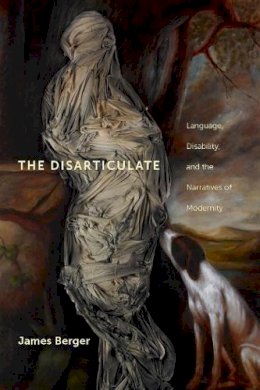9%OFF

Stock image for illustration purposes only - book cover, edition or condition may vary.
The Disarticulate: Language, Disability, and the Narratives of Modernity (Cultural Front)
James Berger
€ 33.99
€ 30.98
FREE Delivery in Ireland
Description for The Disarticulate: Language, Disability, and the Narratives of Modernity (Cultural Front)
Paperback. Drawing on the disarticulate figures in modern fictional works such as Billy Budd, The Sound and the Fury, Nightwood, White Noise, and The Echo Maker, among others, this book shows how these characters mark sites at which aesthetic, philosophical, ethical, political, medical, and scientific discourses converge. Series: Cultural Front. Num Pages: 320 pages, black & white illustrations. BIC Classification: CF; JFFG. Category: (G) General (US: Trade). Dimension: 229 x 153 x 19. Weight in Grams: 428.
Language is integral to our
social being. But what is the status of those who stand outside of language?
The mentally disabled, “wild” children, people with autism and other
neurological disorders, as well as animals, infants, angels, and artificial
intelligences, have all engaged with language from a position at its borders.
In the intricate verbal constructions of modern literature, the
‘disarticulate’—those at the edges of language—have, paradoxically, played
essential, defining roles.
Drawing on the disarticulate figures in
modern fictional works such as Billy Budd, The Sound and the Fury,
... Read more
Product Details
Format
Paperback
Publication date
2014
Publisher
NYU Press
Condition
New
Series
Cultural Front
Number of Pages
320
Place of Publication
New York, United States
ISBN
9780814725306
SKU
V9780814725306
Shipping Time
Usually ships in 7 to 11 working days
Ref
99-21
About James Berger
James Berger is Senior Lecturer in American Studies and English at Yale University. He is author of After the End: Representations of Post-Apocalypse (1999) and a book of poetry, Prior (2013). He is the editor of Helen Keller’s The Story of My Life: The Restored Edition (2003).
Reviews for The Disarticulate: Language, Disability, and the Narratives of Modernity (Cultural Front)
[T]he book is a valuable contribution to disability studies both for its speculations and specific readings. It is a very thoughtful and thought-filled work, nuanced and wide-ranging, which should have an effect on the field.
Critical Inquiry
Critical Inquiry
